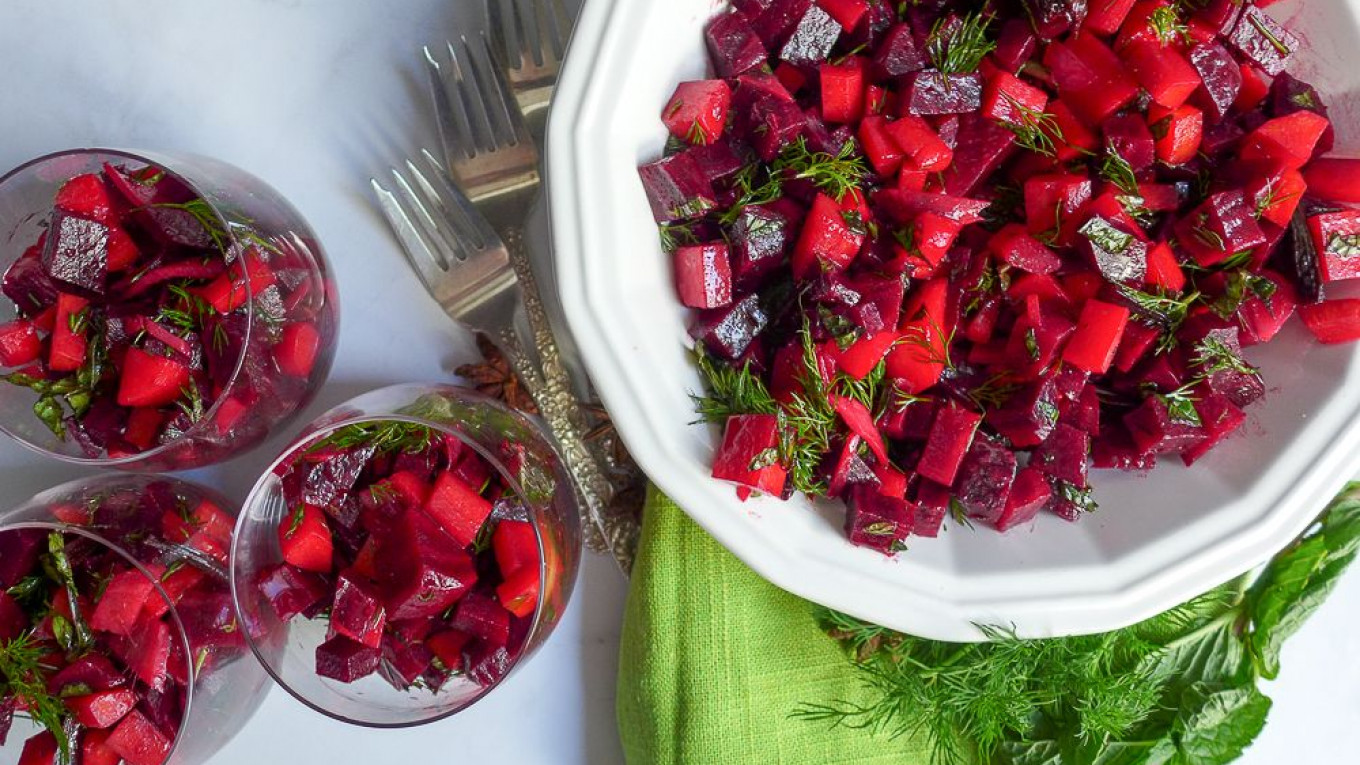Okay, bear with me on this one.
I’m making vinegret for Valentine’s Day.
I’ve been so busy, with no time to bake something gooey, chocolate, and heart shaped. I can’t stop to schlep to the fishmongers for oysters. I opened the fridge and was disappointed but not surprised to discover that we were fresh out of both beef tenderloin and caviar.
This is no way to keep the romance alive.
In my defense, Valentine’s Day in our Russian-American household never really gets off the ground. It’s not that we aren’t romantic — it’s more that Valentine’s Day for us exists on a congested highway of early spring holidays.
My Russian husband claims he’s all about keeping his romantic powder dry for March 8 (International Women’s Day). And this is a not-so-subtle reminder to me of that pithy Russian warning to women that, “how you celebrate March 8 will depend on how you celebrate February 23.” The latter date is Defenders of the Fatherland Day, popularly known as “Men’s Day” since all men in Russia are eligible for mandatory Defense of the Fatherland when they turn 18.
So, Valentine’s Day creeps up on me unawares. As I stood at the refrigerator pondering how to cobble together something that could serve as an aphrodisiac from its end-of-the-week lackluster contents, my daughter passed by and asked me what I was doing.
“Trying to come up with a romantic dish for your father,” I said, “and there is precious little to work with here.”
“Well, Mom,” she said, “making food is your love language — you’ll figure it out.”
And just like that, the jigsaw puzzle pieces of a dish flew together from their disparate locations. Beets, carrots, tangerines, and scallions came up from the crisper, while an unlikely coterie of condiments banned together from the top of the fridge.
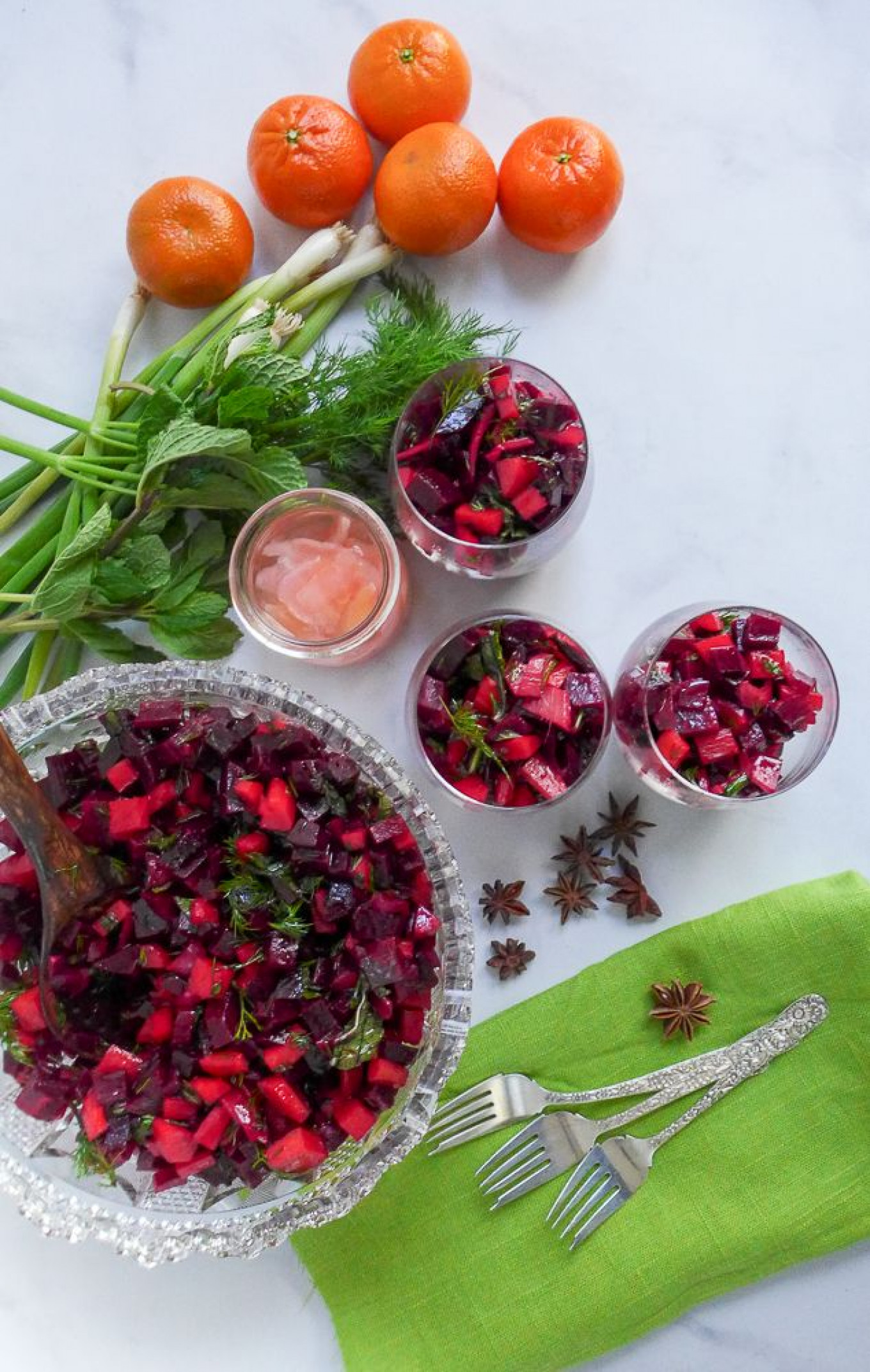
What ensued is definitely not your babushka’s vinegret, but as I donned my apron, it occurred to me that what I was planning was an entirely appropriate continuation of an almost 150-year tradition. The inspiration behind vinegret — that stalwart staple of both zakuska board and dacha picnic — comes from France but made quintessentially Russian by that indomitable Russian ability to repurpose foreign words. Like “intelligent,” for example, which morphed from generic adjective to an entire, albeit small, social class. Here the French “vinaigrette” — an emulsified sauce base of acid and oil, salt, and pepper used to dress fresh and cooked vegetables — was transplanted to Imperial Russia, the Russian vinegret came to refer to a dish of sliced and diced root vegetables with an oil and acid dressing. Culinary historians lay the blame for this error on the serf boys apprenticed to French chefs in the eighteenth-and nineteenth century by their aristocratic masters, in the hopes that they would learn their trade from and ultimately replace their Gallic mentors.
Vinegret should not be confused with its cousin, “Herring Under Fur Coat,” that irreplaceable centerpiece of Russian New Year’s Eve parties, comprising similar ingredients (beets, potatoes, hard-boiled eggs, herring, and picked cucumbers) but cemented together with layers of mayonnaise. Vinegret is an altogether lighter, brighter affair, often included on dietary menus for convalescents or inmates at Russian sanatoria. When you consider the panoply of Russian salads, Vinegret emerges as the rational leader in the healthy stakes.
Vinegret is a convenient salad to have on hand, as I’ve learned while cooking for my multi-generational COVID pod these past 10 months. It lasts a lot longer than a green salad and can be repurposed endlessly: load it on top of hummus to tart things up, toss it with baby spinach for a quick dinnertime salad, stir it into yogurt for a piquant dipping sauce, or add it to rice, buckwheat, or faro for a tasty grain dish.
Vinegret’s ingredients, apart from beets and carrots, are delightfully flexible and elastic; unlike many Russian dishes, there are no hard and fast rules here, so you can go on a tear. I recall a sweet and tangy Vinegret I had one late spring on the Volga with fresh berries and thinly sliced radishes tossed with new beets and baby carrots as fondly as a hardier, more autumnal version with roasted parsnips, chopped walnuts, and pomegranate seeds.
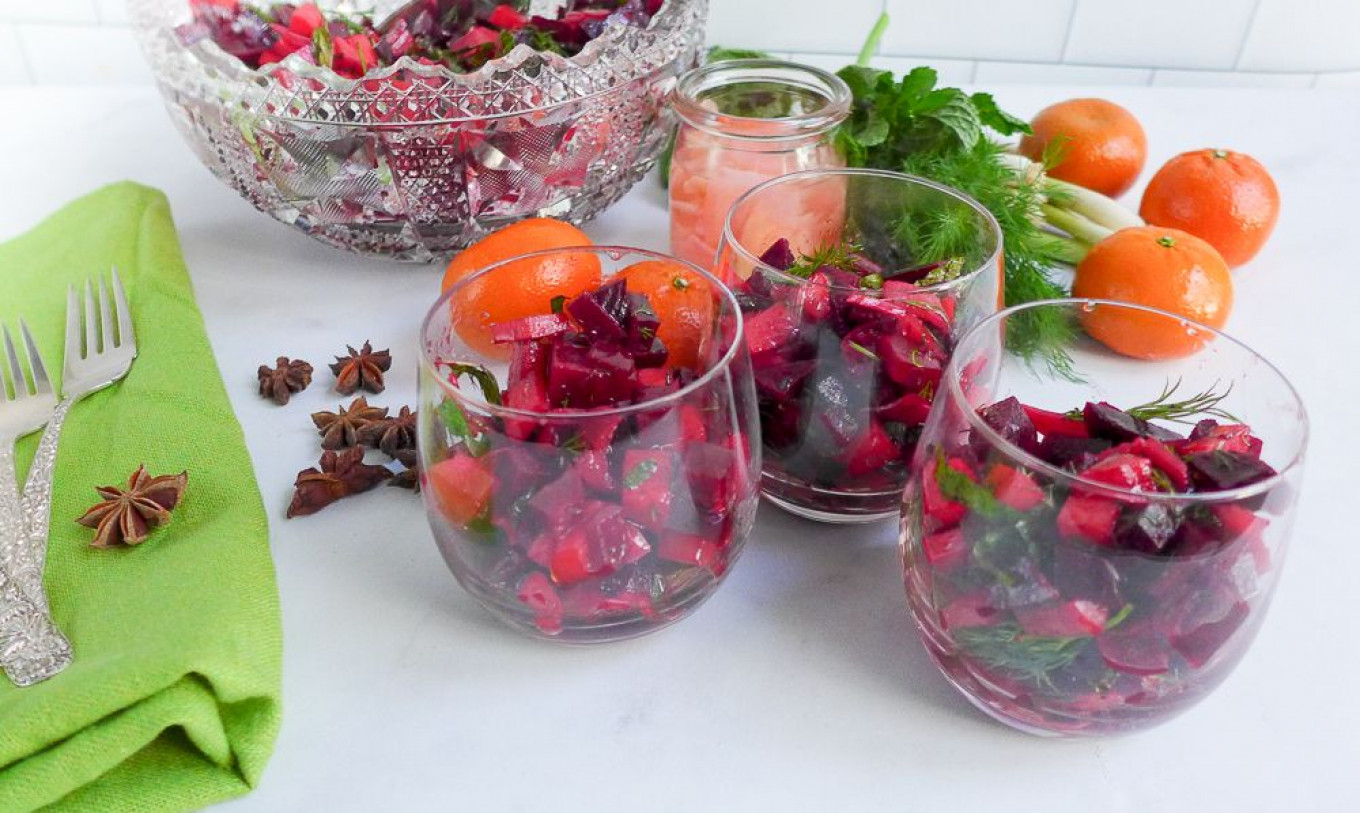
Which brings us to my unlikely band of condiments. Having no fresh ginger, I reached for the jar of pickled ginger I keep for sushi takeaway. This turned out to be one of those happy culinary accidents where substitution creates a whole new dish. Once those delicate pink slices came in contact with the jewel-toned roasted vegetables it was love at first sight! The mouth-puckering tartness perfectly complemented the rich caramelized beets and carrots, providing a whole additional layer of flavor. Of course, I added the (always-for-me obligatory) tablespoons of horseradish and sumac. To create the original vinaigrette for my Vinegret I used tangerine juice and sherry vinegar with olive oil, but balsamic works well too, as does red wine vinegar. A little drizzle of pomegranate molasses adds a good, sweet underpinning, and olive oil brings it all together. In place of traditional pickled cucumbers, I use pickled onions as contrast to the sweetness of the orange and pomegranate and the umami flavors of the roasted vegetables. Finally, Vinegret will always benefit from a final toss with a generous amount of chopped fresh herbs and thinly sliced scallions. The recipe below calls for mint and dill, but parsley, chives, or tarragon would work well too.
So yes, my romantic offering this year will be neither red, nor sweet, nor chocolate. But it is purple, exotic, and spicy enough to spark a romantic mood.
With a Russian anyway…
Bring it on, Valentine’s Day! Bring it on.
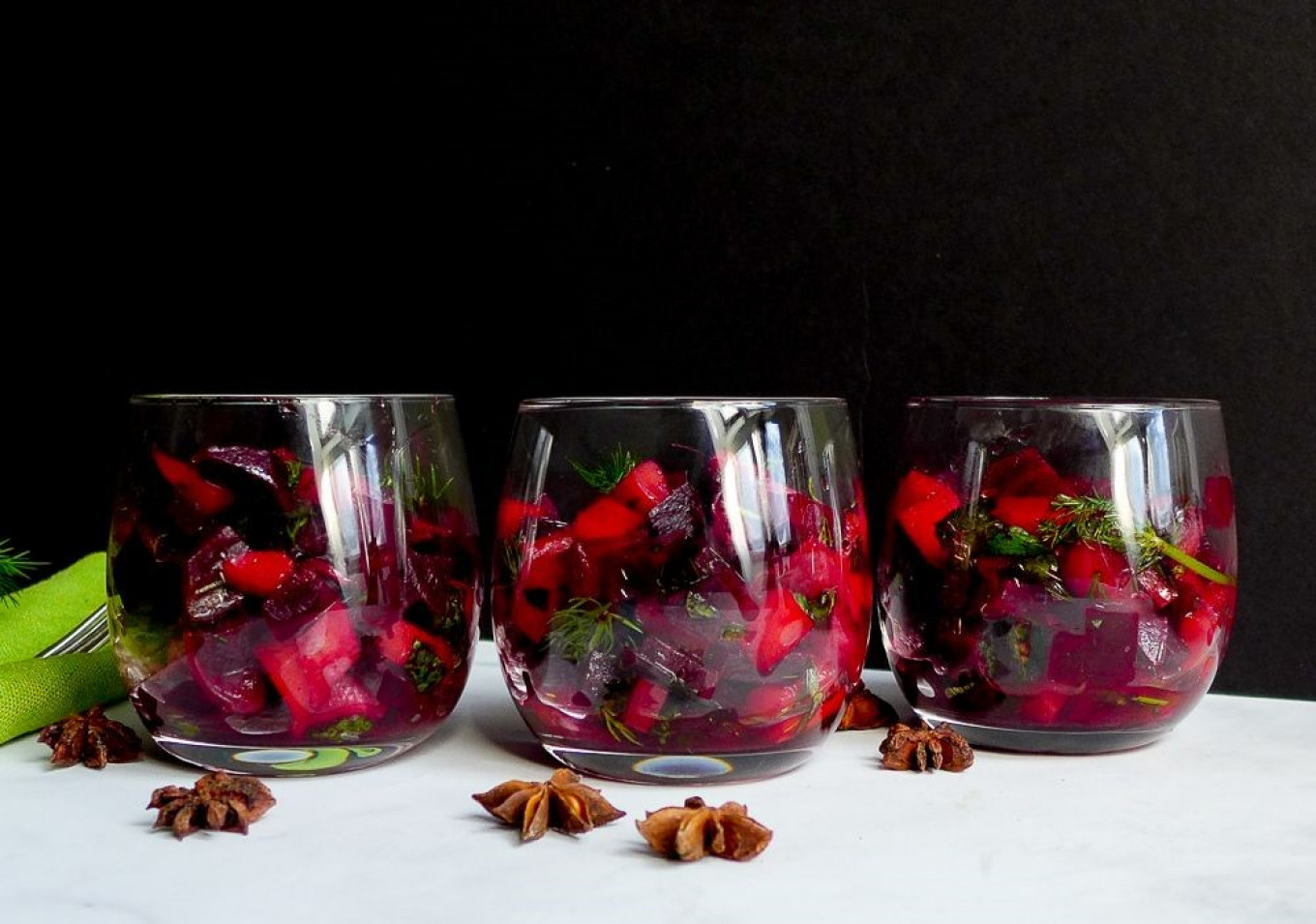
Valentine’s Day Vinegret
Ingredients
- 3-4 large beets
- 3 large carrots, peeled and cut into a fine dice
- 1 cup (230 ml) cocktail onions, sliced into quarters
- ⅔ cup (160 ml) pickled ginger, finely chopped
- 1 cup (230 ml) olive oil, plus 2 Tbsp of olive oil
- 2 Tbsp sherry vinegar
- The juice and zest of one orange or two tangerines
- 2 Tbsp pomegranate molasses
- 2 Tbsp prepared horseradish
- 2 Tbsp sea salt
- 2 Tbsp sumac
- 1 cup (230 ml) chopped herbs: mint, parsley, and dill are great choices
- 1 bunch scallions, cut thinly on the diagonal
Instructions
- Preheat the oven to 400ᵒF (220ᵒC) and line a baking sheet with parchment paper.
- Scrub the beets well, then wrap them loosely in a foil pouch. Toss the carrots with one tablespoon of salt and wrap them loosely in a separate foil pouch. Place the beet pouch on the prepared baking sheet and roast for 25 minutes. Add the carrots after 25 minutes and roast both pouches for an additional 15 minutes. The beets are done when a small, sharp knife easily penetrates the flesh.
- Let the roasted vegetables cool to room temperature. Peel the beets and cut into a small dice, and place in a large, non-reactive bowl with the carrots, cocktail onions and pickled ginger.
- Whisk together the oil, vinegar, orange juice and zest, honey, sumac, horseradish, and pomegranate molasses. Toss the mixture with the vegetables. Cover and let stand for 45 minutes.
- Just before serving, toss the salad with fresh herbs and sliced scallions.
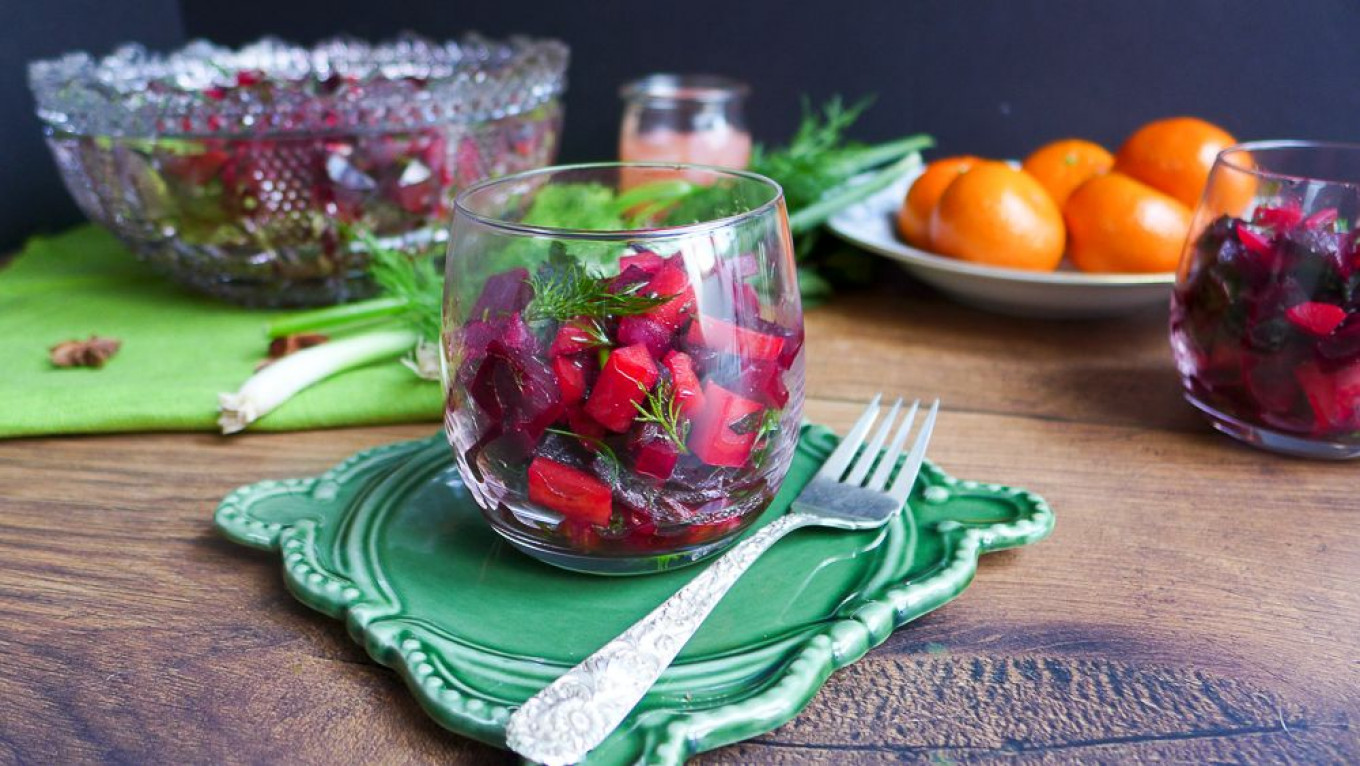
A Message from The Moscow Times:
Dear readers,
We are facing unprecedented challenges. Russia's Prosecutor General's Office has designated The Moscow Times as an "undesirable" organization, criminalizing our work and putting our staff at risk of prosecution. This follows our earlier unjust labeling as a "foreign agent."
These actions are direct attempts to silence independent journalism in Russia. The authorities claim our work "discredits the decisions of the Russian leadership." We see things differently: we strive to provide accurate, unbiased reporting on Russia.
We, the journalists of The Moscow Times, refuse to be silenced. But to continue our work, we need your help.
Your support, no matter how small, makes a world of difference. If you can, please support us monthly starting from just $2. It's quick to set up, and every contribution makes a significant impact.
By supporting The Moscow Times, you're defending open, independent journalism in the face of repression. Thank you for standing with us.
Remind me later.



